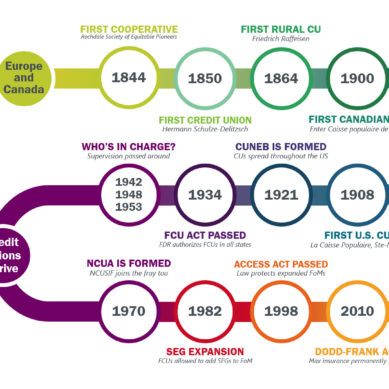For Jim Ryan, President and CEO of JM Associates FCU, the idea of paying a third party to manage his credit cards didn’t make sense. Jim had spent much of his career working in credit unions and the very idea of outsourcing a strategic service like credit cards was antithetical to the purpose of credit unions. This is especially true for JM Associates FCU, whose primary purpose is to provide the highest quality services to its members.
Full-service vendors often present the problem of credit union card service as an all or nothing proposition. It isn’t. Sure, there are many features of credit card processing that may be unmanageable for credit unions to facilitate in-house. But even the largest banks contract out some services. Managing the actual movement of money and loan fulfillment, or the ‘switch,’ must be done by a card processor.
Full-service credit card processing can vary based on the functions that are outsourced to a third party. Primarily, the database of cardholders is outsourced; secondly, all or part of the credit card program’s operations are contracted out; and finally, the credit union can, to some extent, turn over the card sales and marketing to an outsider.
With a pass-through credit card program (also known as “in-house”), it is managed in a manner similar to how the credit union manages its debit card program. From database, to operations, to marketing, the majority of card issuing functions are performed internally with a host of vendors. These vendors provide support for rewards, network connectivity, and other ancillary services outsourced but supervised by the credit union. As Jim advises, “If a credit union can manage a debit program, it can manage its own credit card program.”
The five myths
During his tenure at JM Associates FCU, Jim says he has heard all the reasons why a credit union “can’t manage their own credit cards” or “is better off outsourcing their cards.” According to Jim, most objections to in-house credit card processing are really just myths that are easily identifiable and can be overcome with effort.
“You may have a different list of reasons why you are hesitant to bring your credit card program in-house,” said Jim, “but there are a few JMAFCU had to overcome before we could get comfortable with the idea.” Here are the primary “Myths” Jim identified as hurdles to employing in-house credit.
- You cannot provide adequate credit card member service in-house.
- You must provide live 24-hour customer service.
- Credit card processing is too difficult for you or your staff to understand.
- Dispute handling is difficult.
- You cannot adequately handle fraud prevention.
These myths were so established that JM Associates FCU’s own board members expressed similar concerns to him about opting out of “Full-Service.” The myths outlined above are part of a presentation Jim shared with his board to help them understand why an in-house credit card program is the best solution for the credit union. The descriptions below detail how Jim was able to explain how each myth could be overcome by JM Associates FCU.
Myth #1: You cannot provide adequate credit card member service in-house
This first myth is more fear than reality. Credit unions are concerned that credit cards are too complicated and challenging to manage. This myth is often perpetuated by those peddling full-service credit. In reality, credit unions are fully capable and often better equipped to service a credit card program.
“JMAFCU is a high-touch credit union. We found our card processor was often providing incorrect information or our members did not like the way it was delivered, and they ended up calling our member service representatives. We could respond to our members better than they could. Are your members frustrated with the service they are receiving from a third party?”
Myth #2: You must provide live 24-hour customer service
In many respects, it’s hard to distinguish one third-party call center from another. As Forester notes in a recent research report, contact centers have invested heavily in self-service technologies and will continue to transition service from live agents to artificial intelligence technology.
“Our card processor showed us statistics to validate that their automated system was handling 90% of all calls. We determined that abandoned calls were considered “handled” by the automated system. Our members were hanging up because they could not get to a real person.”
Myth #3: Credit card processing is too difficult for you or your staff to understand
It’s true that credit card processing is competitive and requires credit unions to be keenly aware of the changes in the market. However, the fundamental operations have not changed that much in decades.
As Jim explains, “Outsource the pieces you are not comfortable with, but handle what you are or can be comfortable with. You understand loans, finance charges, fees, member service and marketing. Do it. If you have a debit card program, you are already addressing fraud prevention. Expand it. It’s not that difficult. If you are not handling your debit card program in-house, why aren’t you?”
Myth #4: Dispute handling is difficult
In recent years, Visa and MasterCard have simplified and streamlined their dispute processes. Further, most card processors offer dispute processing as an add-on for both debit and credit because the networks’ rules are very similar for both. Jim notes that how you want to support dispute processing comes down to how you want to best treat your members.
“This one can be tricky unless you make sure you have a good dispute process. You want to do what you do best and that is work with your member to obtain information,” said Jim. “If you obtain the right servicer, the actual dispute process will not require a degree in “dispute-ology.” For those of you who have looked through the Visa dispute manual, you will know what I mean.”
Myth #5: You cannot adequately handle fraud prevention
Fraud is an ongoing battle for any credit union, but no one understands a credit union’s member payments and transactions better than the card and operations team that works there. Teaming your debit and credit fraud offers multiple opportunities for monitoring and mitigating card fraud.
“I’ll say it again, if you have a debit card program, you are already addressing this,” states Jim. “If you have completely outsourced fraud monitoring for both programs, you may be spending more money than you need to. You should be involved in setting your fraud controls and making contact with your members for suspicious transactions. You want them to trust you.”
Don’t let myths stop success
Even though there has been a lot of market consolidation, there are many good card processors that have experience in processing cards for credit unions. What Jim has shown in dispelling the “myths of full-service” is that credit unions are better served by keeping the member-facing features of credit card programs in-house.
Members are the most important asset any credit union has, and no vendor understands the needs of members more than the credit union itself. Bringing card service in-house and partnering with a vendor to manage the back-end processing is not only the simplest approach—it’s the best.
Today, JM Associates FCU has one of the highest issuer penetration rates for credit cards among its members (36%). This success comes from a comprehensive and strategic vision on behalf of the credit union’s leadership as well as a deep dedication by the card and operations teams to ensure members are receiving the best service.

























































